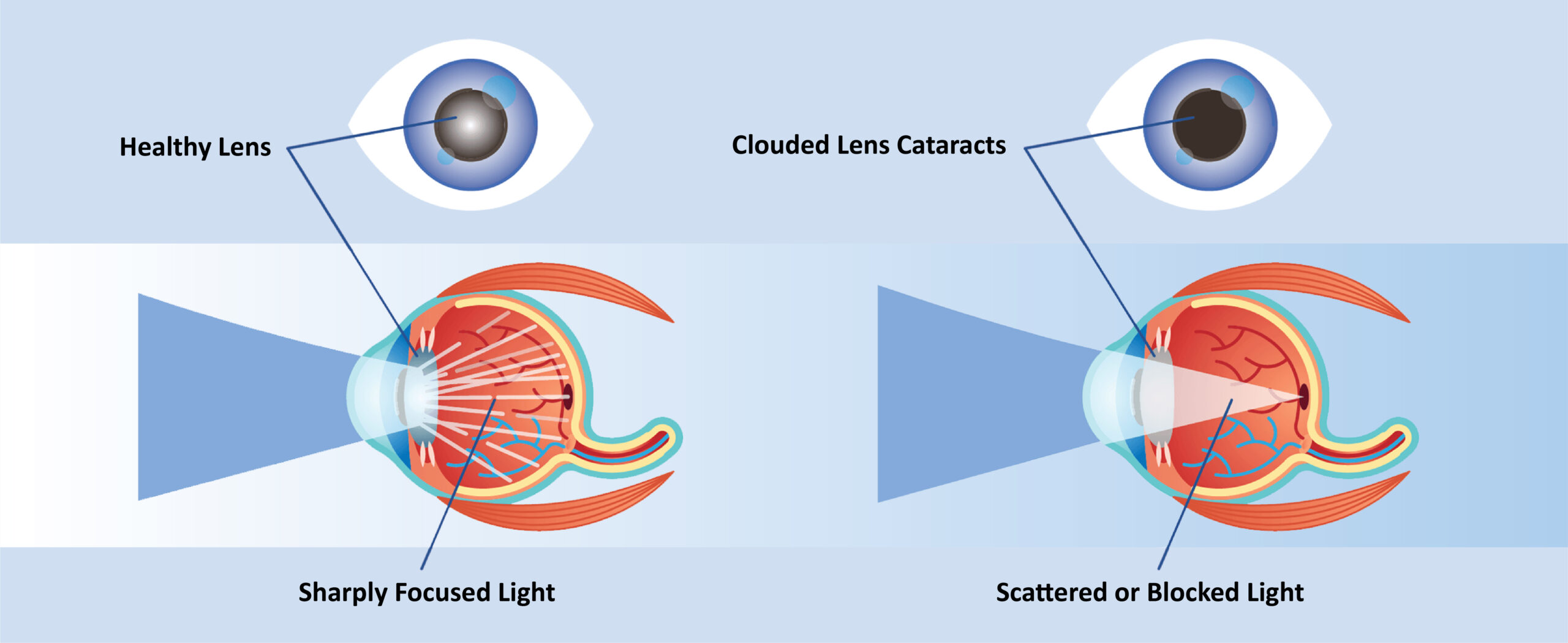
A cataract is a clouding of the eye’s lens caused by the accumulation of protein layers. It grows with time and, if not checked, can lead to blindness. People suffering from cataracts have blurred vision as they have to see through cloudy lenses or fogged-up windows. This cloudy vision causes various challenges, including challenges while reading, driving a car during the night period or judging anyone’s expression over the face.
The most common types of cataracts are nuclear cataracts, age-related cataracts, congenital cataracts, trauma-based cataracts, and secondary cataracts that can be caused by ongoing diseases like glaucoma and diabetes.
What causes various types of cataracts?
The most common cause of cataracts is seen in adults above the age of 50 when the proteins in the eye’s lens naturally start to break down. Most cataracts happen because of these natural changes. Other than age-related cataracts, many different types need to be studied, and researchers are still learning exactly why cataracts form. They have found factors other than aging that make cataracts more likely.
Earlier it was believed that old age cataract would start after 60 years or 65 years, but now it is not so, youngsters who are in their late 20’s or even in their late 30’s are prone to cataract disorder. For the patients who are younger, the main reason for cataract is the side effects of the medication they are taking which mainly have steroids content . For example, if a patient has a specific type of skin problem and they opted for steroids for a long time or maybe the patient is suffering from tuberculosis, and have taken treatment for TB for a long time and so on. If there is any such problem in our body.
Another primary reason for cataract formation is high blood sugar in people with diabetes, which makes cataracts more likely to form. We all know diabetes has become a pandemic, and it is impacting people of all ages, but research shows that those with difficulty with glycemic control and people who have had diabetes for a long time are more likely to develop cataracts.
Cataract Without Surgery
When discussing various latest Ayurvedic treatments without surgery to check cataracts, Ayurveda is the best choice, including herbal eye drops and herbal medications. When the cataract is in its initial or early stage, ayurvedic treatment is the best way to check its progress, but as the chronicity increases, the cure takes more time.
The best way to treat cataract without surgery is to have the correct diagnosis and take the right Ayurvedic medications under the guidance of an Ayurvedic expert. All your initial tests are conducted by the latest equipment at our hospital where your eye pressure and eyesight is being checked followed by diagnosis with an Ayurvedic expert.
In cataract treatment without surgery, with the use of Ayurvedic Medication we completely remove the protein layer that is formed. Many patients who have issues even after Cataract surgery come for Ayurveda Treatment or once they have got the operation done, mostly after two-three years, complaining their vision has again started decreasing. Even after getting their lens changed they complain about less light from or report dull vision problems. With Ayurvedic Cataract treatment without surgery we do not just treat the root cause of cataract but take care of the retinal complication placed behind the lens and make sure that it also regenerates the less light problem which patients complain making sure that the cataract is completely cured.
Cataract Treatment in Ayurveda
With its time-tested and effective cataract treatment, Ayurveda addresses underlying bodily imbalances and promotes overall eye health. Here are some of the commonly used Ayurvedic medicines for cataracts:
- Anjana: This Ayurvedic herbal collyrium, made with Madhuka, Triphala, and Amla, can help delay cataract progression.
- Netra Tarpana: This treatment involves placing a dough ring around the eyes and filling it with medicated ghee. It nourishes and strengthens the eyes, aiding in cataract management.
- Aschodanam: These Ayurvedic eye drops, made from goat milk and eye-nourishing herbs, support eye health.
- Siravedam: Bloodletting, performed after proper snehana (oleation) and swedana (sudation), can help manage cataract symptoms.
Ayurveda views cataracts as a complex condition requiring a personalized treatment approach. By addressing the underlying imbalances and supporting overall health, Ayurveda can help manage and prevent cataracts. However, seeking professional medical advice before trying new cataract treatments is crucial to ensure your safety and informed decision-making.
You Can Also Read For More Posts
Dr Basu Ayurvedic Cataract treatment without surgery
To Know More, Talk to our Consultant. Dial +91-8235808080
